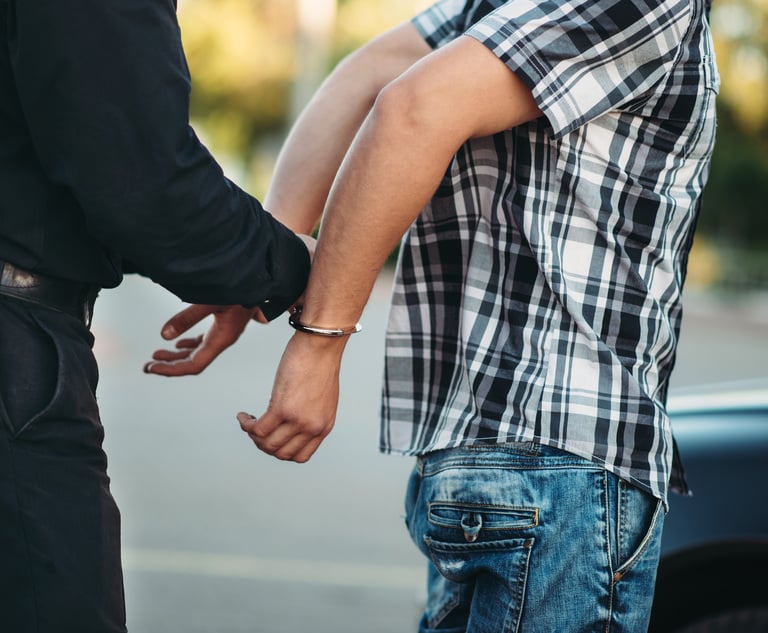Hartford State's Attorney Suspended for 4 Days Over Handling of Police-Involved Shootings
The state's Criminal Justice Commission suspended the Hartford State's Attorney Gail Hardy for four days without pay Thursday. Hardy is up for reappointment to the post later this month.
June 18, 2020 at 05:53 PM
3 minute read
 Connecticut Supreme Court Associate Justice Andrew McDonald is also chairman of the state's Criminal Justice Commission. Courtesy photo
Connecticut Supreme Court Associate Justice Andrew McDonald is also chairman of the state's Criminal Justice Commission. Courtesy photo
Connecticut's Criminal Justice Commission voted unanimously Thursday to suspend Hartford State's Attorney Gail Hardy for four days without pay over her handling of four police-involved shootings, the commission chairman said.
Hardy will be suspended Friday, Monday, Tuesday and Wednesday, Associate Supreme Court Justice Andrew McDonald, also the chairman of the commission, said. She will return to her post on June 25. She will appear before the commission June 26 for her reappointment hearing. Hardy's eight-year terms expires at the end of this month, McDonald said.
Hardy was suspended for her role in failing to report the findings of four police-involved shootings in a timely manner.
The state's NBC affiliate quoted McDonald as saying during the meeting Thursday morning that there was a "serious dereliction in duty for her inexcusable delay in submitting these reports." The shootings occurred between 2008 and 2012, the outlet reported.
Hardy did not respond to a request for comment Thursday afternoon. She was one of several candidates for the position of chief state's attorney earlier this year. That job went to Richard Colangelo Jr., former state's attorney for the Judicial District of Stamford/Norwalk.
Several experts said the current national climate of rallies and protests almost daily since the May 25 killing of unarmed black man George Floyd at the hands of police could have been a factor in the commission's decision.
"You have to consider the context. There is a national reevaluation of police and prosecutorial conduct," said Mark Dubois, the state's first chief disciplinary counsel who now practices with Geragthy & Bonnano in New London.
The Minneapolis incident in which Floyd was killed is the latest of several.
"The Black Lives Matter movement has been pushing for years for police reform," Dubois said. "I don't think the Criminal Justice Commission was saying that attorney Hardy should have found one way or the other in her reports, but justice delayed is justice denied. She was late in her findings, which doesn't promote police confidence in the system. The system should critically self-evaluate on a timely basis."
Bill Dunlap, a professor of law at Quinnipiac University School of Law echoed Dubois' comments, and said the unpaid suspension "is a way the public does not lose faith in the criminal justice system."
"It could have been easier to just let her term run out later this month, but instead they suspended her," Dunlap. "The caveat there, I think, is they wanted to make a point that police-involved shootings are very serious and need to be dealt with."
Dunlap said the timing of the suspension in the wake of massive protests on police brutality and reform the past three weeks in this country and globally "could very well be related to Minneapolis, but it could also be coincidental."
Related stories:
Search Is on for New State's Attorney; Interviews Will Be Televised
'This Is the Civil Rights Movement of My Lifetime': Black Law Students Demand Action
This content has been archived. It is available through our partners, LexisNexis® and Bloomberg Law.
To view this content, please continue to their sites.
Not a Lexis Subscriber?
Subscribe Now
Not a Bloomberg Law Subscriber?
Subscribe Now
NOT FOR REPRINT
© 2025 ALM Global, LLC, All Rights Reserved. Request academic re-use from www.copyright.com. All other uses, submit a request to [email protected]. For more information visit Asset & Logo Licensing.
You Might Like
View All
'They Are Never Going to Learn': Geico Not Protected by Litigation Privilege
3 minute read
K&L Gates Files String of Suits Against Electronics Manufacturer's Competitors, Brightness Misrepresentations
3 minute read
Eleven Attorneys General Say No to 'Unconstitutional' Hijacking of State, Local Law Enforcement
3 minute readTrending Stories
- 1Midsize Firm Bressler Amery Absorbs Austin Boutique, Gaining Four Lawyers
- 2Bill Would Allow Californians to Sue Big Oil for Climate-Linked Wildfires, Floods
- 3LinkedIn Suit Says Millions of Profiles Scraped by Singapore Firm’s Fake Accounts
- 4Supreme Court Agrees to Hear Lawsuit Over FBI Raid at Wrong House
- 5What It Takes to Connect With Millennial Jurors
Who Got The Work
J. Brugh Lower of Gibbons has entered an appearance for industrial equipment supplier Devco Corporation in a pending trademark infringement lawsuit. The suit, accusing the defendant of selling knock-off Graco products, was filed Dec. 18 in New Jersey District Court by Rivkin Radler on behalf of Graco Inc. and Graco Minnesota. The case, assigned to U.S. District Judge Zahid N. Quraishi, is 3:24-cv-11294, Graco Inc. et al v. Devco Corporation.
Who Got The Work
Rebecca Maller-Stein and Kent A. Yalowitz of Arnold & Porter Kaye Scholer have entered their appearances for Hanaco Venture Capital and its executives, Lior Prosor and David Frankel, in a pending securities lawsuit. The action, filed on Dec. 24 in New York Southern District Court by Zell, Aron & Co. on behalf of Goldeneye Advisors, accuses the defendants of negligently and fraudulently managing the plaintiff's $1 million investment. The case, assigned to U.S. District Judge Vernon S. Broderick, is 1:24-cv-09918, Goldeneye Advisors, LLC v. Hanaco Venture Capital, Ltd. et al.
Who Got The Work
Attorneys from A&O Shearman has stepped in as defense counsel for Toronto-Dominion Bank and other defendants in a pending securities class action. The suit, filed Dec. 11 in New York Southern District Court by Bleichmar Fonti & Auld, accuses the defendants of concealing the bank's 'pervasive' deficiencies in regards to its compliance with the Bank Secrecy Act and the quality of its anti-money laundering controls. The case, assigned to U.S. District Judge Arun Subramanian, is 1:24-cv-09445, Gonzalez v. The Toronto-Dominion Bank et al.
Who Got The Work
Crown Castle International, a Pennsylvania company providing shared communications infrastructure, has turned to Luke D. Wolf of Gordon Rees Scully Mansukhani to fend off a pending breach-of-contract lawsuit. The court action, filed Nov. 25 in Michigan Eastern District Court by Hooper Hathaway PC on behalf of The Town Residences LLC, accuses Crown Castle of failing to transfer approximately $30,000 in utility payments from T-Mobile in breach of a roof-top lease and assignment agreement. The case, assigned to U.S. District Judge Susan K. Declercq, is 2:24-cv-13131, The Town Residences LLC v. T-Mobile US, Inc. et al.
Who Got The Work
Wilfred P. Coronato and Daniel M. Schwartz of McCarter & English have stepped in as defense counsel to Electrolux Home Products Inc. in a pending product liability lawsuit. The court action, filed Nov. 26 in New York Eastern District Court by Poulos Lopiccolo PC and Nagel Rice LLP on behalf of David Stern, alleges that the defendant's refrigerators’ drawers and shelving repeatedly break and fall apart within months after purchase. The case, assigned to U.S. District Judge Joan M. Azrack, is 2:24-cv-08204, Stern v. Electrolux Home Products, Inc.
Featured Firms
Law Offices of Gary Martin Hays & Associates, P.C.
(470) 294-1674
Law Offices of Mark E. Salomone
(857) 444-6468
Smith & Hassler
(713) 739-1250











